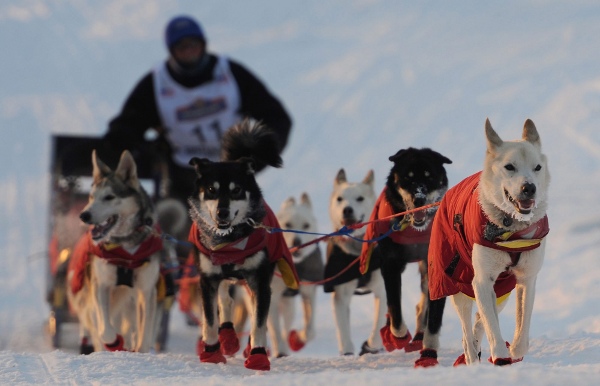Sled-dog race organizer promises better dog shelters
 In the wake of the death of Dorado, the first dog death in four years, the Iditarod Trail Committee is aiming to improve how dropped dogs are handled.
In the wake of the death of Dorado, the first dog death in four years, the Iditarod Trail Committee is aiming to improve how dropped dogs are handled.
On Wednesday, the organization that runs the world’s most popular sled-dog race announced it would make changes to the Unalakleet dog yard next year.
Among them would be the construction of dog boxes in the hub communities of McGrath and Unalakleet, major checkpoints along the 1,000-mile trail across the wilds of Alaska where dropped dogs often accumulate before flying to Anchorage, Alaska’s largest city.
Iditarod organizers vowed to arrange for more frequent flights to move dogs out of checkpoints quicker and to patrol the dropped-dog lots more often.
Iditarod Spokeswoman Erin McLarnon said in the press release the Iditarod was working with multiple stakeholders on solutions. Among them is the Nome-based Iditarod Official Finishers Club. Vice President Jim Gallea, a three-time Iditarod finisher, said the club – which he described as a non-profit “players union” representing finishers of the 1,000-mile race – was in talks with the Iditarod Trail Committee but he added that it was too early to announce specific changes.
“This is going to be a work in progress over months, heck even years,” Gallea said.
New Connex shelters
Gallea did note that the finishers club has helped purchase and construct small shelters for race volunteers in the Nome and Unalakleet dog yards. Gallea said the shelters have a Connex storage container-style doors and windows, designed to allow volunteers to better monitor nearby dog yards. However, work remains to be done, including the installation of heaters in the containers. Gallea said the club plans to upgrade the shelters before next year’s race.
“We’re always looking for ways that we can try and improve things in terms of preventing this type of accident happening in the future,” he said.
The race announced the changes after releasing the results of a preliminary investigation into Dorado’s death. The 5-year-old dog of Fairbanks musher Paige Drobny was found dead in on the morning of March 15. Dorado was one of 130 dropped dogs in the Unalakleet checkpoint, which serves as a collection point for many of the dogs dropped along the trail.
Unalakleet, population 700, is the largest town before the Nome race finish and the first race checkpoint on Alaska’s western coast. A fierce windstorm blew into the community March 14. About 100 of the dogs were moved into an airplane hangar to protect them from the storm. But limited by space, 30 dogs remained outside.
According to the Iditarod, a veterinarian checked on the dogs at 3 a.m., and again at 8:30 a.m. By then eight of the dogs had been covered by drifting snow. While being covered by snow was not an “optimal condition,” it’s not typically something that causes alarm, according to McLarnon. All of the dogs except Dorado were in good condition.
Challenging PETA
Following the Dorado’s death, animal rights advocates swiftly condemned of the race. On March 18, People for the Ethical Treatment of Animals called for criminal charges in a blog post, and accused Drobny of leaving the dog unattended.
On Thursday, Bethel attorney Myron Angstman demanded that PETA retract the allegation and apologize or face a possible lawsuit. Angstman said in the letter that Drobny has been inundated with personal attacks via calls and emails from PETA’s estimated 3 million supporters.
“It is unclear where you retrieved information stating that Ms. Drobny had left her dog unattended,” Angstman wrote. “It is also unclear how you draw the conclusion that Ms. Drobny can be directly blamed for the death of the dog. What is perfectly clear, though, is that your information is wrong.”
Dropped dogs are left in the care of race veterinarians.
Drobny and her husband, fellow musher Cody Strathe, posted on their Squid Acres Kennel blog Wednesday calling the ITC findings and changes to dropped dog care “positive change” for future races.
Contact Suzanna Caldwell at suzanna(at)alaskadispatch.com
For more stories from Alaska Dispatch, click here



